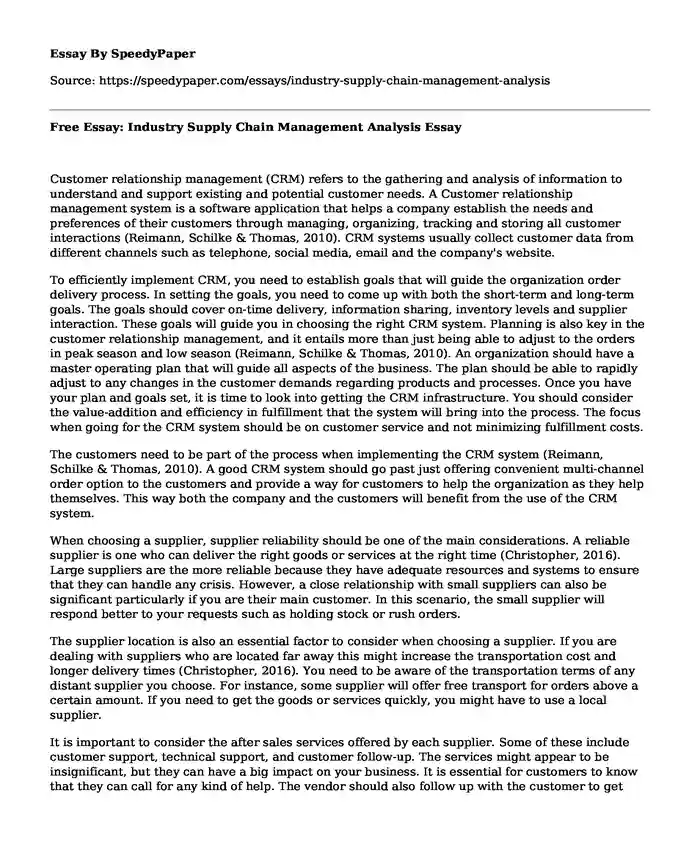
| Type of paper: | Essay |
| Categories: | CRM Supply chain management |
| Pages: | 3 |
| Wordcount: | 760 words |
Customer relationship management (CRM) refers to the gathering and analysis of information to understand and support existing and potential customer needs. A Customer relationship management system is a software application that helps a company establish the needs and preferences of their customers through managing, organizing, tracking and storing all customer interactions (Reimann, Schilke & Thomas, 2010). CRM systems usually collect customer data from different channels such as telephone, social media, email and the company's website.
To efficiently implement CRM, you need to establish goals that will guide the organization order delivery process. In setting the goals, you need to come up with both the short-term and long-term goals. The goals should cover on-time delivery, information sharing, inventory levels and supplier interaction. These goals will guide you in choosing the right CRM system. Planning is also key in the customer relationship management, and it entails more than just being able to adjust to the orders in peak season and low season (Reimann, Schilke & Thomas, 2010). An organization should have a master operating plan that will guide all aspects of the business. The plan should be able to rapidly adjust to any changes in the customer demands regarding products and processes. Once you have your plan and goals set, it is time to look into getting the CRM infrastructure. You should consider the value-addition and efficiency in fulfillment that the system will bring into the process. The focus when going for the CRM system should be on customer service and not minimizing fulfillment costs.
The customers need to be part of the process when implementing the CRM system (Reimann, Schilke & Thomas, 2010). A good CRM system should go past just offering convenient multi-channel order option to the customers and provide a way for customers to help the organization as they help themselves. This way both the company and the customers will benefit from the use of the CRM system.
When choosing a supplier, supplier reliability should be one of the main considerations. A reliable supplier is one who can deliver the right goods or services at the right time (Christopher, 2016). Large suppliers are the more reliable because they have adequate resources and systems to ensure that they can handle any crisis. However, a close relationship with small suppliers can also be significant particularly if you are their main customer. In this scenario, the small supplier will respond better to your requests such as holding stock or rush orders.
The supplier location is also an essential factor to consider when choosing a supplier. If you are dealing with suppliers who are located far away this might increase the transportation cost and longer delivery times (Christopher, 2016). You need to be aware of the transportation terms of any distant supplier you choose. For instance, some supplier will offer free transport for orders above a certain amount. If you need to get the goods or services quickly, you might have to use a local supplier.
It is important to consider the after sales services offered by each supplier. Some of these include customer support, technical support, and customer follow-up. The services might appear to be insignificant, but they can have a big impact on your business. It is essential for customers to know that they can call for any kind of help. The vendor should also follow up with the customer to get their feedback and any recommendations they might have.
Vendor knowledge of their products is an essential business skill. A knowledgeable supplier will represent the benefits of the product accurately and persuasively and this will increase the customers' confidence in your products (Christopher, 2016).
A good vendor should have favorable maintenance and return policies that make it easy for their customers to return goods (Reimann, Schilke & Thomas, 2010). The vendor should provide a 90 days return policy from the date of purchase. They can also issue warranties to make it easier to access maintenance services.
The logistics of moving products from the supplier to the consumers is a very challenging aspect of the business. The logistics will mainly be determined by the type of products you deal with, the industry you're in and the customer's needs (Christopher, 2016). However, most businesses prefer to outsource these services rather than perform them. Outsourcing logistics is preferred because it reduces costs and gives the company space to focus on their core business.
References
Christopher, M. (2016). Logistics & supply chain management. Pearson UK.
Reimann, M., Schilke, O., & Thomas, J. S. (2010). Customer relationship management and firm performance: the mediating role of business strategy. Journal of the Academy of Marketing Science, 38(3), 326-346.
Cite this page
Free Essay: Industry Supply Chain Management Analysis. (2022, Feb 24). Retrieved from https://speedypaper.com/essays/industry-supply-chain-management-analysis
Request Removal
If you are the original author of this essay and no longer wish to have it published on the SpeedyPaper website, please click below to request its removal:
- Free Essay Containing a TOEFL Waiver Request Letter Sample
- Understanding Employee Motivation, HRM Essay Sample
- Essay Sample Dedicated to the Human Resource Policies of the ICRC
- Something New about Bitcoin Data Analysis, Essay Sample for You
- Free Paper with the Annotated Bibliography Example on Overweight and Obesity
- Organizational Systems and Quality Leadership - Free Essay
- Essay Example on What is Artificial Intelligence
Popular categories




